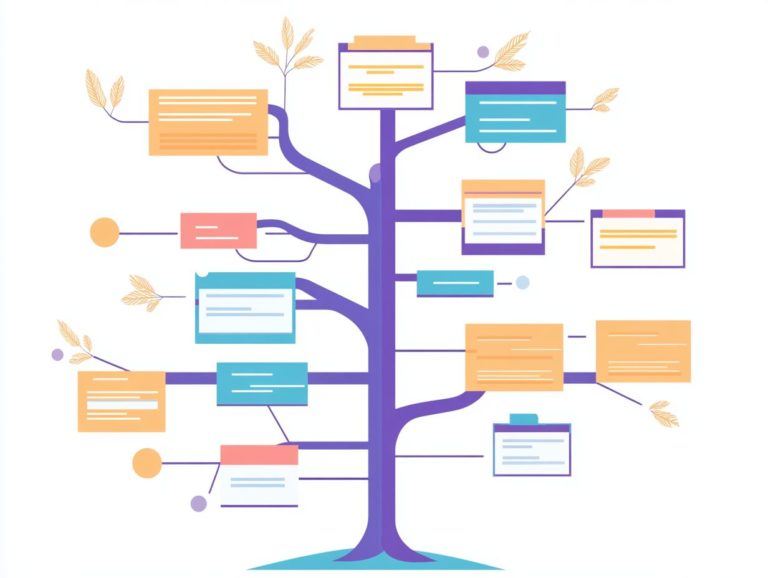common challenges in project management
Project management is a complex job, inherently laden with challenges.
As a project manager, you must navigate a landscape filled with potential pitfalls, from scope creep to resource allocation. This article delves into the most prevalent hurdles encountered in the field, including communication breakdowns and risk management dilemmas.
You will discover practical strategies for overcoming these obstacles, as well as best practices to prevent them from arising in the first place. Dive in to discover powerful insights that could transform your project management skills!
Contents
Key Takeaways:

Scope creep and changes are common challenges in project management that can affect timelines and budgets. Effective planning and communication can help prevent or minimize their impact.
Resource management is crucial in project management, as inadequate resources can lead to delays and conflicts. It is important for project managers to prioritize and delegate tasks effectively.
Communication and collaboration are essential for the success of any project. Project managers should establish clear communication channels and encourage open communication among team members to avoid misunderstandings and conflicts.
Defining Project Management
Project management is both an art and a science, where you plan, execute, and oversee projects to achieve specific objectives while navigating defined constraints like scope, time, and budget. It s a systematic approach that places you in the role of project manager, responsible for coordinating resources and managing what people involved expect.
Mastering project management demands a deep understanding of various methodologies, including Agile, along with the tools and techniques necessary for tracking progress and monitoring performance to guarantee project success. In every industry whether it s construction or software development the significance of project management is immense.
It serves as the backbone of any undertaking, ensuring that all aspects of a project are harmonized, facilitating collaboration among teams, and streamlining communication pathways. The project lifecycle, which includes phases like initiation, planning, execution, monitoring, and closure, is crucial in steering projects toward successful outcomes.
Setting clear project goals helps provide direction and create a framework for measuring progress and defining success criteria. This ultimately leads to enhanced stakeholder satisfaction and overall performance.
Common Challenges Faced by Project Managers
As a project manager, you encounter a multitude of challenges that can impede your project s success, such as scope creep, communication breakdowns, and unrealistic expectations from stakeholders. These hurdles threaten your project s timeline and affect resource allocation and risk management efforts.
Recognizing these common challenges is crucial for you, as it enables you to implement effective training programs and strategies to mitigate potential risks. This proactive approach ensures that your projects remain within budget and are completed on schedule.
Scope Creep and Changes
Scope creep is when project requirements grow beyond the original plan and can present significant challenges for you as a project manager. It often creeps in due to unclear expectations or poor documentation, leading to budget overruns and missed deadlines.
To tackle scope creep, it’s essential for you to enforce strict project constraints, provide regular updates, and engage stakeholders effectively to ensure alignment on project goals. This phenomenon can seriously undermine the overall success of your project, eroding stakeholder confidence and stretching your resources thin.
You may find yourself needing additional funding or personnel, which complicates the project landscape further. When your team members are faced with unexpected tasks, they might struggle to prioritize their workload, resulting in increased stress and burnout.
To navigate these challenges successfully, effective communication and clear documentation are key. By defining project boundaries right from the start and involving all relevant parties in discussions, you can foster a more stable environment and significantly reduce the risk of undesirable changes.
Take immediate steps to strengthen your project boundaries to prevent delays and utilize these strategies today to experience immediate improvement!
Resource Management
Effective resource management serves as a cornerstone of successful project management. It requires careful allocation of project resources to efficiently meet your goals.
As a project manager, you must assess the availability and skills of your team members. Utilize project software, such as Microsoft Project, a tool for tracking project timelines and tasks, and Asana, which helps teams manage their work, to track progress and ensure quality control throughout the project lifecycle.
This balancing act is essential for avoiding budget overruns and ensuring timely project completion. Your ability to identify and optimize both human and material resources directly impacts the success of your projects.
Tools like Microsoft Project and Asana not only help you track resource allocation but also provide valuable insights into performance metrics. This enables you to make proactive adjustments when necessary.
Integrating these resources within a cohesive framework fosters collaboration and accountability among your team members. By implementing strategies for maintaining quality control such as regular checkpoints and feedback loops you can safeguard against potential risks and enhance your project deliverables.
This ultimately supports the overarching objectives of your project.
Communication and Collaboration

Effective communication and collaboration among your team members are crucial for the successful execution of any project. However, when communication breaks down, misunderstandings and delays can creep in.
As a project manager, you play a pivotal role in cultivating a culture of open communication and teamwork. Leverage training programs to equip your team with essential skills.
By ensuring frequent updates and establishing clear channels for dialogue, you can significantly enhance project outcomes. In the realm of project management, communication serves as more than just information sharing; it lays the foundation for trust and clarity within the team.
Common barriers, such as differing communication styles, cultural differences, and a lack of clarity around objectives, often obstruct this vital process. To counter these challenges, implement strategies such as:
- Regular check-ins
- Utilizing collaboration tools
- Defining roles clearly
It s imperative that you actively recognize and mitigate these barriers. Create an environment where every team member feels enabled to voice their ideas and concerns. This approach will ultimately drive the project toward successful completion.
Risk Management
Risk management is your proactive strategy for identifying, assessing, and mitigating potential risks that could derail your project objectives. It s about developing contingency plans and strategies to navigate constraints while accurately estimating risks and their impacts on timelines and budgets.
As a skilled project manager, you must navigate these complexities to keep stakeholders informed and ensure project goals are consistently met. This crucial component of project management boosts your chances of achieving desired outcomes and fosters a risk-aware culture within your team.
Effective risk management starts with identifying potential risks through group discussions, surveys, and expert consultations. In the assessment phase, you will prioritize these risks based on their likelihood of occurrence and potential impact.
From there, craft mitigation strategies aimed at reducing the probability of risks manifesting or minimizing their effects should they occur. Developing contingency plans acts as your safety net, ensuring that alternative courses of action are readily available.
As the project manager, you play a vital role in maintaining open communication with stakeholders. Actively seek their input and keep them updated on risk status. This approach fosters trust and collaboration throughout the project lifecycle.
Strategies for Overcoming Project Management Challenges
Overcoming common project management challenges demands a sophisticated approach that weaves together effective strategies, thorough planning, and strengthened team collaboration.
Leverage project management software to streamline processes. Ensure accountability among team members and cultivate open lines of communication to significantly reduce risks and enhance project outcomes.
Adopt these strategies to boost efficiency and elevate the likelihood of achieving project success.
Effective Planning and Project Management Tools
Effective planning is essential for executing your projects successfully. Leveraging the right project management tools can significantly enhance this process.
As a project manager, you understand the importance of these tools in managing tricky tasks and meeting deadlines. For instance, Gantt charts help you visualize project timelines and dependencies, while Kanban boards streamline your workflow and prioritize tasks effectively.
Software like Trello and Asana supports these methodologies and offers features that enhance collaboration. This ensures that your entire team stays aligned. Tools like Microsoft Project provide strong analytics for performance monitoring, allowing you to identify bottlenecks and allocate resources efficiently.
Utilizing these resources helps you maintain a competitive edge, enabling your team to deliver high-quality results on time.
Team Building and Communication Techniques
Team building and effective communication techniques are essential for creating a collaborative environment that drives project success. As a project manager, you must implement various training programs and conflict resolution strategies to cultivate healthy team dynamics.
By establishing clear communication channels and promoting teamwork, you can reduce misunderstandings and ensure the team aligns with project goals. Regular check-ins and feedback sessions can greatly enhance relationships among team members, making them feel valued.
Using collaboration software elevates transparency, keeping everyone informed and connected throughout the project lifecycle. Identifying individual strengths and delegating tasks accordingly boosts morale and encourages collective problem-solving.
Nurturing an inclusive atmosphere that emphasizes open dialogue helps you resolve conflicts before they escalate. This turns potential disruptions into opportunities for growth and stronger team cohesion.
Adapting to Changes and Contingency Planning

Adapting to changes and having robust contingency plans are crucial for effective project management, especially in dynamic environments. As a project manager, you must assess project constraints and devise flexible strategies while keeping stakeholders informed about updates.
Your ability to adapt to unexpected challenges is what makes projects shine! By regularly reviewing progress and identifying potential pitfalls, you can implement timely adjustments to keep everything on track.
Establishing an open channel for communication ensures stakeholders remain informed about significant shifts in project direction. This transparency builds trust and encourages collaborative problem-solving, enhancing the project’s resilience.
Keep team members and stakeholders informed with regular updates to reduce anxiety during changes. This fosters a culture of adaptability essential for navigating today s project complexities.
How to Prevent Common Project Management Challenges
Preventing project management challenges is crucial for your project s success. You can achieve this by embracing best practices and fostering a culture of continuous learning.
By routinely evaluating your team’s skills and offering targeted project training, you equip them with the knowledge necessary to adeptly navigate obstacles.
Cultivating an environment focused on learning and improvement elevates your team’s capabilities and boosts overall project productivity and efficiency.
Start implementing these strategies today to take your project management skills to the next level!
Best Practices for Project Management
Implementing best practices in project management is essential for achieving outstanding outcomes and minimizing risks. These practices include structured project planning, encouraging clear communication, and promoting team collaboration.
By adhering to these principles, you can streamline processes and enhance the likelihood of success while meeting stakeholder expectations.
Structured planning involves defining clear objectives, timelines, and resource allocations, which serve as your roadmap for the entire project. For instance, utilizing project management tools like Gantt charts can help you visualize task dependencies and deadlines.
Regular communication ensures that your team members are aligned and aware of their responsibilities, reducing misunderstandings and delays. Consider holding weekly check-in meetings to discuss progress and proactively address potential issues.
Collaboration tools like Slack or Trello can further elevate teamwork, allowing for real-time updates and efficient problem-solving among your team.
Ultimately, these best practices create a cohesive environment where project goals can be effectively achieved, setting you on a path to success.
Continuous Learning and Improvement
Continuous learning and improvement are essential in project management, enabling you and your team to adapt to ever-evolving challenges while enhancing your skill sets.
By investing in training programs and regularly assessing skills, your organization can cultivate a culture of development that fosters improved collaboration and leads to overall project success.
This commitment to learning addresses current challenges and prepares you for future opportunities. As project management methodologies advance, staying updated through workshops, online courses, and certifications can significantly elevate your team’s qualifications.
By prioritizing skills assessments, leadership can identify areas where individuals may benefit from additional support or training, allowing for a tailored approach to professional development.
These exciting strategies boost your skills and energize your team’s spirit, reflecting in the quality and efficiency of project delivery.
Embracing a mindset of continuous learning ensures that your teams remain resilient and responsive to shifts within the industry, securing their competitiveness in a fast-paced environment.
Frequently Asked Questions
What are some common challenges in project management?

Some common challenges in project management include poor communication, scope creep, budget constraints, timeline delays, lack of stakeholder buy-in, and resource management issues.
How does poor communication impact project management?
Poor communication can lead to misunderstandings, delays, and conflict within a project team. It can also result in important information being missed or not properly communicated to stakeholders, causing further challenges down the line.
What is scope creep and how does it affect projects?
Scope creep is when a project’s goals keep changing, which can cause delays and extra costs. This uncontrolled growth of a project’s scope beyond its original boundaries can hinder success.
How can budget constraints be a challenge in project management?
Budget constraints can limit the resources available to complete a project, resulting in compromises on quality or scope. This can also lead to conflicts with stakeholders who may have different expectations for the project outcomes.
What are some common causes of timeline delays in project management?
Timeline delays can be caused by various factors, such as inaccurate project planning, unexpected roadblocks, poor resource management, and scope creep. External factors like weather, market changes, or political events can impact project timelines.
How can project managers effectively manage resources to avoid challenges?
Project managers can effectively manage resources by creating a resource management plan, regularly monitoring resource allocation and availability, and making adjustments as needed. It is also important to communicate and collaborate with team members to ensure resources are being used efficiently and effectively.
Ready to elevate your project management skills? Dive into the resources we offer!






